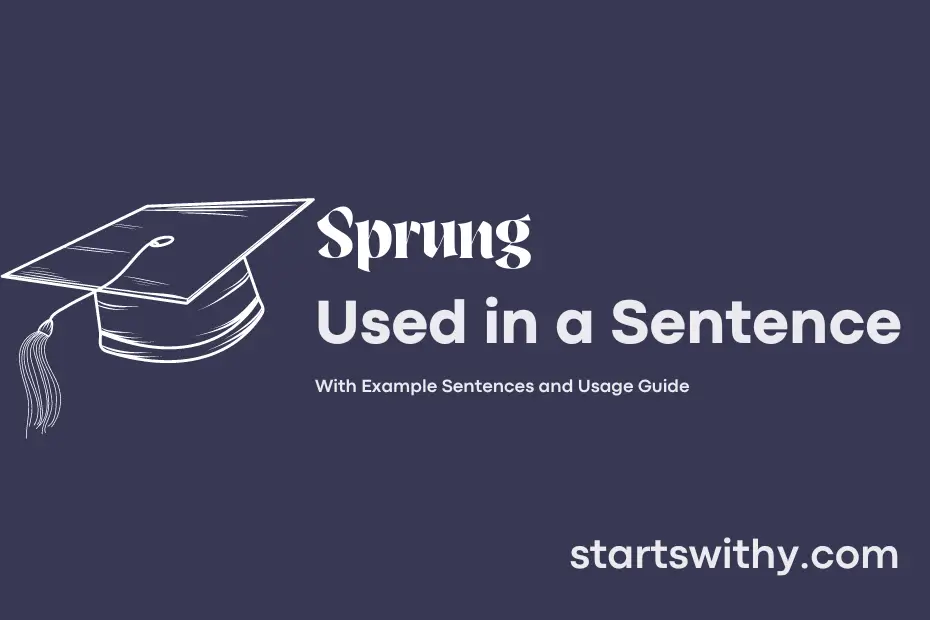Have you ever come across the word “sprung” in English and wondered what it means? In simple terms, the word “sprung” is a verb that denotes the action of something unexpectedly arising or suddenly appearing.
When we use “sprung” in a sentence, it often describes a situation where something has emerged or come into existence abruptly, catching one off guard. This versatile term can convey the idea of a surprise or a spontaneous event, adding a dynamic element to the sentence.
7 Examples Of Sprung Used In a Sentence For Kids
- The flowers sprung up from the ground.
- I sprung out of bed this morning.
- A squirrel sprung from tree to tree.
- The cat sprung after the mouse.
- A jack-in-the-box sprung open with a surprise.
- A kangaroo sprung high into the air.
- The ball sprung back when it hit the wall.
14 Sentences with Sprung Examples
- SPRUNG out of bed as soon as the alarm went off for the morning lecture.
- Couldn’t believe how quickly the rumor about the cancelled class SPRUNG up on campus.
- After studying all night, a sudden inspiration SPRUNG to mind for the assignment.
- SPRUNG a surprise quiz on the class for an unexpected test of knowledge.
- The idea of starting a new student club SPRUNG during a casual conversation in the cafeteria.
- SPRUNG up to grab the last seat in the library during exam week.
- The campus party ticket sales SPRUNG up overnight causing excitement among the students.
- A new study group SPRUNG up in the engineering department to help with difficult courses.
- SPRUNG at the chance to join the sports team when a spot opened up last minute.
- Campus gossip about the upcoming concert SPRUNG up in every group chat.
- SPRUNG for joy after receiving the high grades on the project that was a group effort.
- A sudden rainstorm SPRUNG up, causing chaos for students trying to get to classes on time.
- The opportunity to do an internship abroad SPRUNG up unexpectedly and caused excitement among the students.
- With the end of semester approaching, the idea of a road trip with friends SPRUNG up as a much-needed break from studies.
How To Use Sprung in Sentences?
To use the word Sprung in a sentence, follow these simple steps:
-
Understand the meaning of Sprung. Sprung is the past tense of the verb Spring, which means to move suddenly and swiftly. It is often used to describe something that has popped up, jumped out, or emerged quickly.
-
Choose the appropriate context. Sprung is commonly used to describe plants growing or flowers blooming. For example, “The flowers sprung up quickly after the rain.”
-
Construct a sentence that includes the word Sprung in the appropriate tense and context. Make sure the sentence makes sense and is grammatically correct. For instance, “A squirrel sprung out of the bushes and surprised the hikers.”
-
Ensure that your sentence is conveying the intended meaning and that Sprung is used correctly. It should accurately reflect something that has happened suddenly or unexpectedly.
-
Practice using the word Sprung in different sentences to become more familiar with its usage. This will help you gain confidence in incorporating it into your vocabulary.
By following these steps, you can effectively use the word Sprung in a sentence and enhance your communication skills. Remember to pay attention to the meaning and context of the word to ensure it fits appropriately in your sentence.
Conclusion
In this article, we explored sentences with “sprung” to understand how it is used in various contexts. The word “sprung” is commonly employed to denote sudden action or movement, such as “he sprung out of bed” or “she sprung into action.” It signifies a quick and energetic shift from one state to another, adding a sense of spontaneity and speed to the sentence.
With its ability to convey swift and unexpected change, “sprung” brings dynamism and vividness to the sentences where it is employed. Whether describing physical movement or a change in emotion or state of being, the word “sprung” enhances the narrative by injecting a sense of urgency and immediacy. By studying sentences with “sprung,” we can appreciate how language is used to paint vibrant and lively pictures in our minds.



